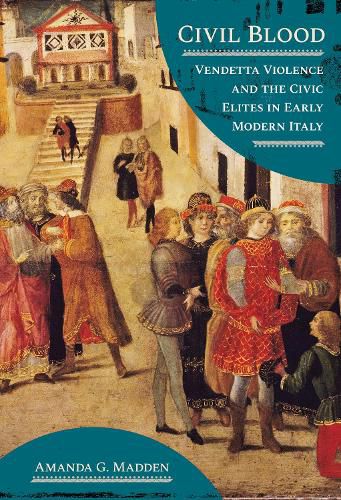Readings Newsletter
Become a Readings Member to make your shopping experience even easier.
Sign in or sign up for free!
You’re not far away from qualifying for FREE standard shipping within Australia
You’ve qualified for FREE standard shipping within Australia
The cart is loading…






Civil Blood is a study of the practice of vendetta among the civic elites in sixteenth-century Italy and illustrates the complex and integral role that vendetta violence played in civic life and state formation on the winding path to state centralization. At many temporal, geographic, and political points in early modern Italy, vendetta appears to not only disrupt, but also constitute the processes by which the modern state emerges.
Amanda G. Madden examines vendetta as both central to politics and an engine of change and illustrates the degree to which key phenomena of the period-state centralization, growing bureaucracies, institutional reforms, and the process of state formation as such-were interpenetrated by, and not simply opposed to, ongoing factional violence among civic elites.
Madden further illuminates in Civil Blood how elites utilized violent enmities to maintain a grip on political control and also negotiated with the duke concerning political power and civic prerogatives. As a result, ruling elites not only defined their own place in governance, but also shaped the function and definition of government.
$9.00 standard shipping within Australia
FREE standard shipping within Australia for orders over $100.00
Express & International shipping calculated at checkout
Civil Blood is a study of the practice of vendetta among the civic elites in sixteenth-century Italy and illustrates the complex and integral role that vendetta violence played in civic life and state formation on the winding path to state centralization. At many temporal, geographic, and political points in early modern Italy, vendetta appears to not only disrupt, but also constitute the processes by which the modern state emerges.
Amanda G. Madden examines vendetta as both central to politics and an engine of change and illustrates the degree to which key phenomena of the period-state centralization, growing bureaucracies, institutional reforms, and the process of state formation as such-were interpenetrated by, and not simply opposed to, ongoing factional violence among civic elites.
Madden further illuminates in Civil Blood how elites utilized violent enmities to maintain a grip on political control and also negotiated with the duke concerning political power and civic prerogatives. As a result, ruling elites not only defined their own place in governance, but also shaped the function and definition of government.